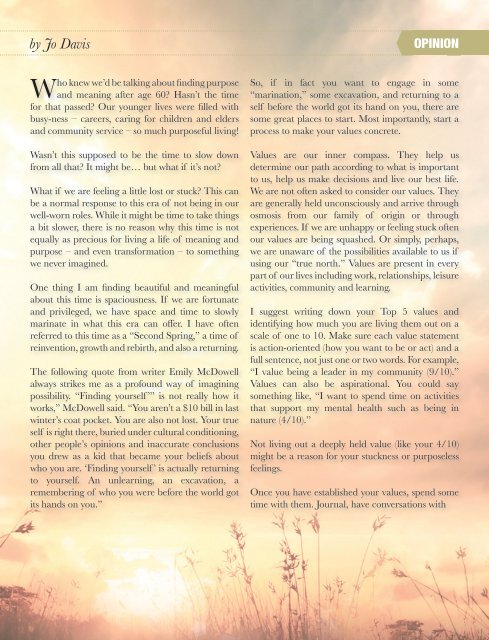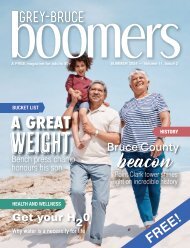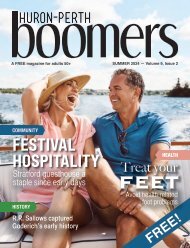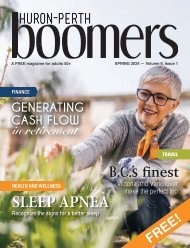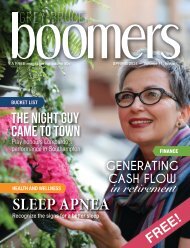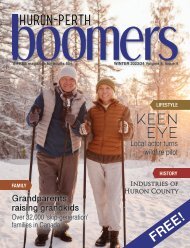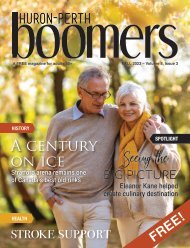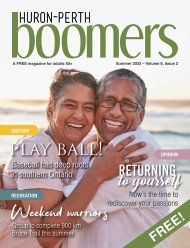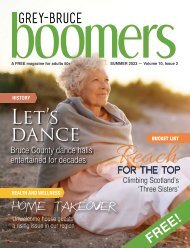Grey-Bruce Boomers Fall 2023
Create successful ePaper yourself
Turn your PDF publications into a flip-book with our unique Google optimized e-Paper software.
y Jo Davis<br />
Who knew we’d be talking about finding purpose<br />
and meaning after age 60? Hasn’t the time<br />
for that passed? Our younger lives were filled with<br />
busy-ness – careers, caring for children and elders<br />
and community service – so much purposeful living!<br />
Wasn’t this supposed to be the time to slow down<br />
from all that? It might be… but what if it’s not?<br />
What if we are feeling a little lost or stuck? This can<br />
be a normal response to this era of not being in our<br />
well-worn roles. While it might be time to take things<br />
a bit slower, there is no reason why this time is not<br />
equally as precious for living a life of meaning and<br />
purpose – and even transformation – to something<br />
we never imagined.<br />
One thing I am finding beautiful and meaningful<br />
about this time is spaciousness. If we are fortunate<br />
and privileged, we have space and time to slowly<br />
marinate in what this era can offer. I have often<br />
referred to this time as a “Second Spring,” a time of<br />
reinvention, growth and rebirth, and also a returning.<br />
The following quote from writer Emily McDowell<br />
always strikes me as a profound way of imagining<br />
possibility. “Finding yourself ’” is not really how it<br />
works,” McDowell said. “You aren’t a $10 bill in last<br />
winter’s coat pocket. You are also not lost. Your true<br />
self is right there, buried under cultural conditioning,<br />
other people’s opinions and inaccurate conclusions<br />
you drew as a kid that became your beliefs about<br />
who you are. ‘Finding yourself ’ is actually returning<br />
to yourself. An unlearning, an excavation, a<br />
remembering of who you were before the world got<br />
its hands on you.”<br />
OPINION<br />
So, if in fact you want to engage in some<br />
“marination,” some excavation, and returning to a<br />
self before the world got its hand on you, there are<br />
some great places to start. Most importantly, start a<br />
process to make your values concrete.<br />
Values are our inner compass. They help us<br />
determine our path according to what is important<br />
to us, help us make decisions and live our best life.<br />
We are not often asked to consider our values. They<br />
are generally held unconsciously and arrive through<br />
osmosis from our family of origin or through<br />
experiences. If we are unhappy or feeling stuck often<br />
our values are being squashed. Or simply, perhaps,<br />
we are unaware of the possibilities available to us if<br />
using our “true north.” Values are present in every<br />
part of our lives including work, relationships, leisure<br />
activities, community and learning.<br />
I suggest writing down your Top 5 values and<br />
identifying how much you are living them out on a<br />
scale of one to 10. Make sure each value statement<br />
is action-oriented (how you want to be or act) and a<br />
full sentence, not just one or two words. For example,<br />
“I value being a leader in my community (9/10).”<br />
Values can also be aspirational. You could say<br />
something like, “I want to spend time on activities<br />
that support my mental health such as being in<br />
nature (4/10).”<br />
Not living out a deeply held value (like your 4/10)<br />
might be a reason for your stuckness or purposeless<br />
feelings.<br />
Once you have established your values, spend some<br />
time with them. Journal, have conversations with


